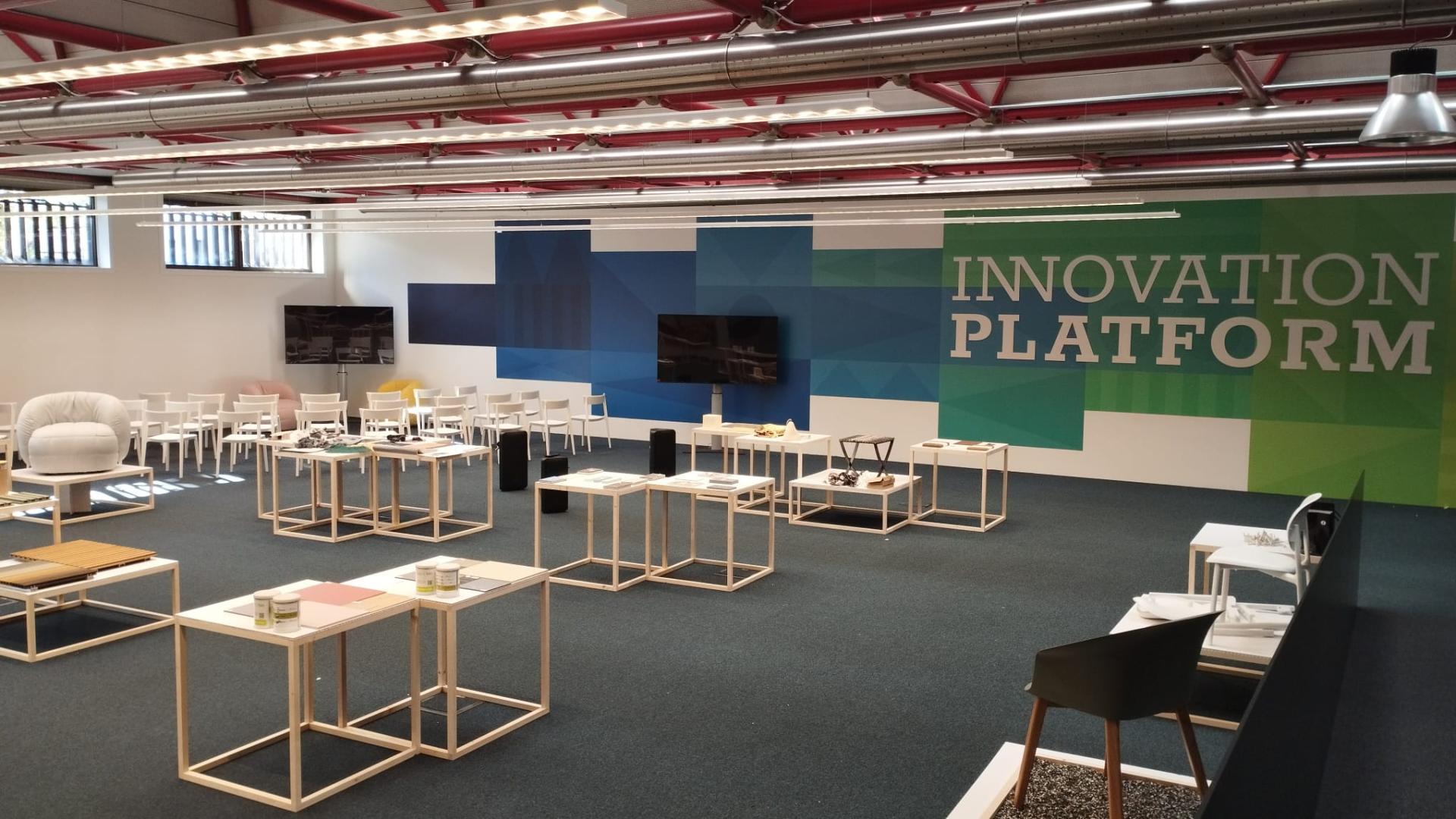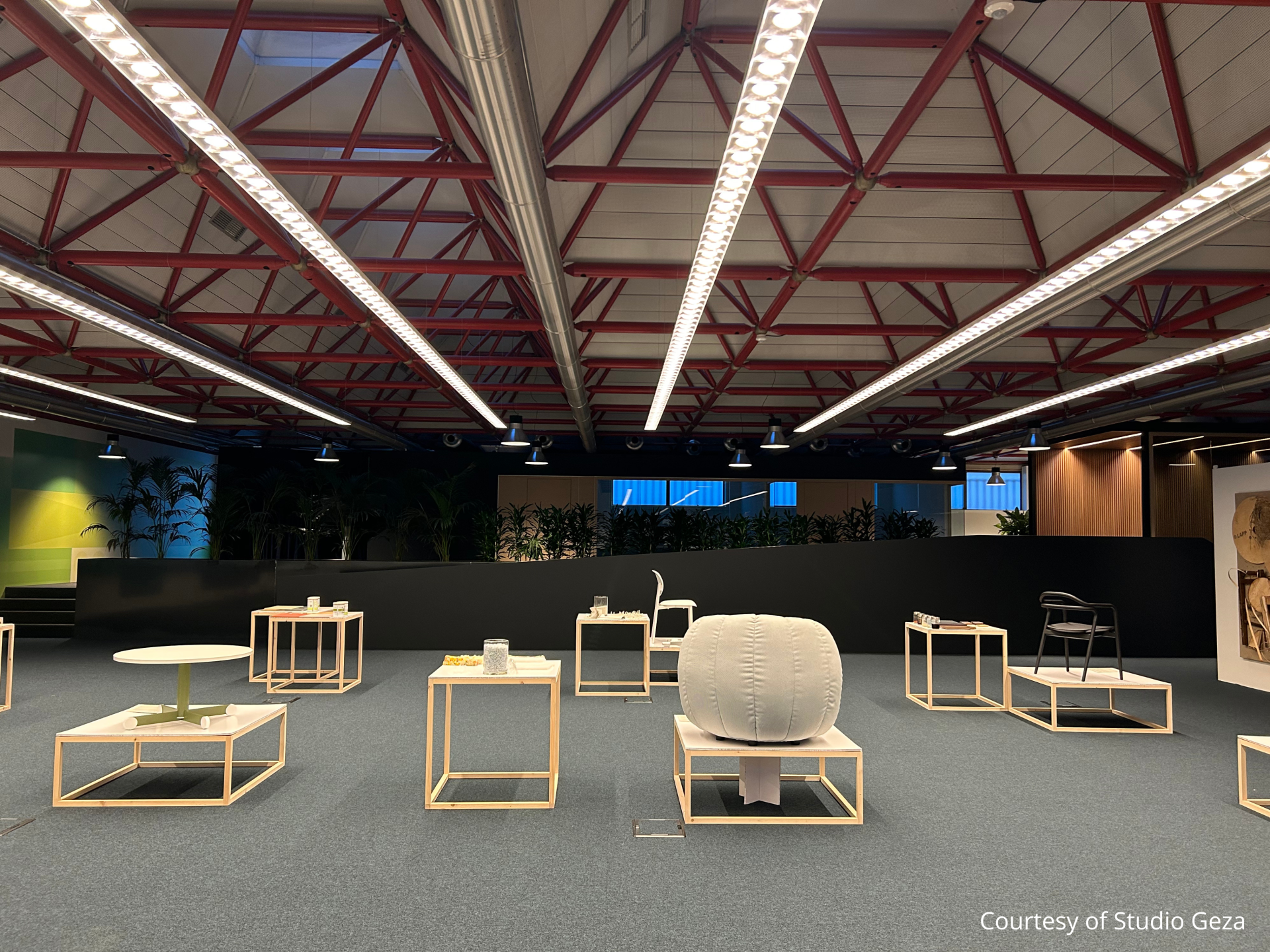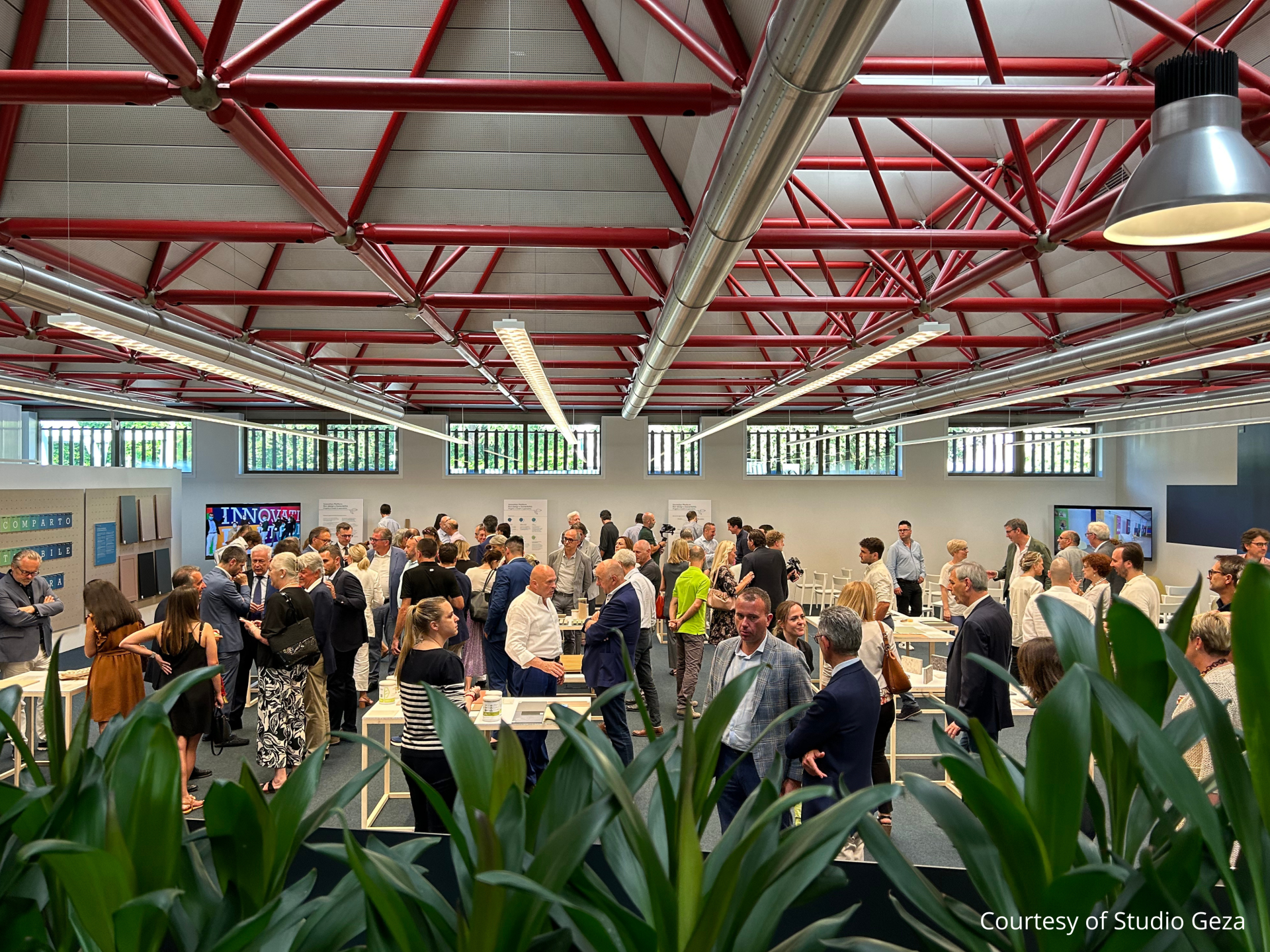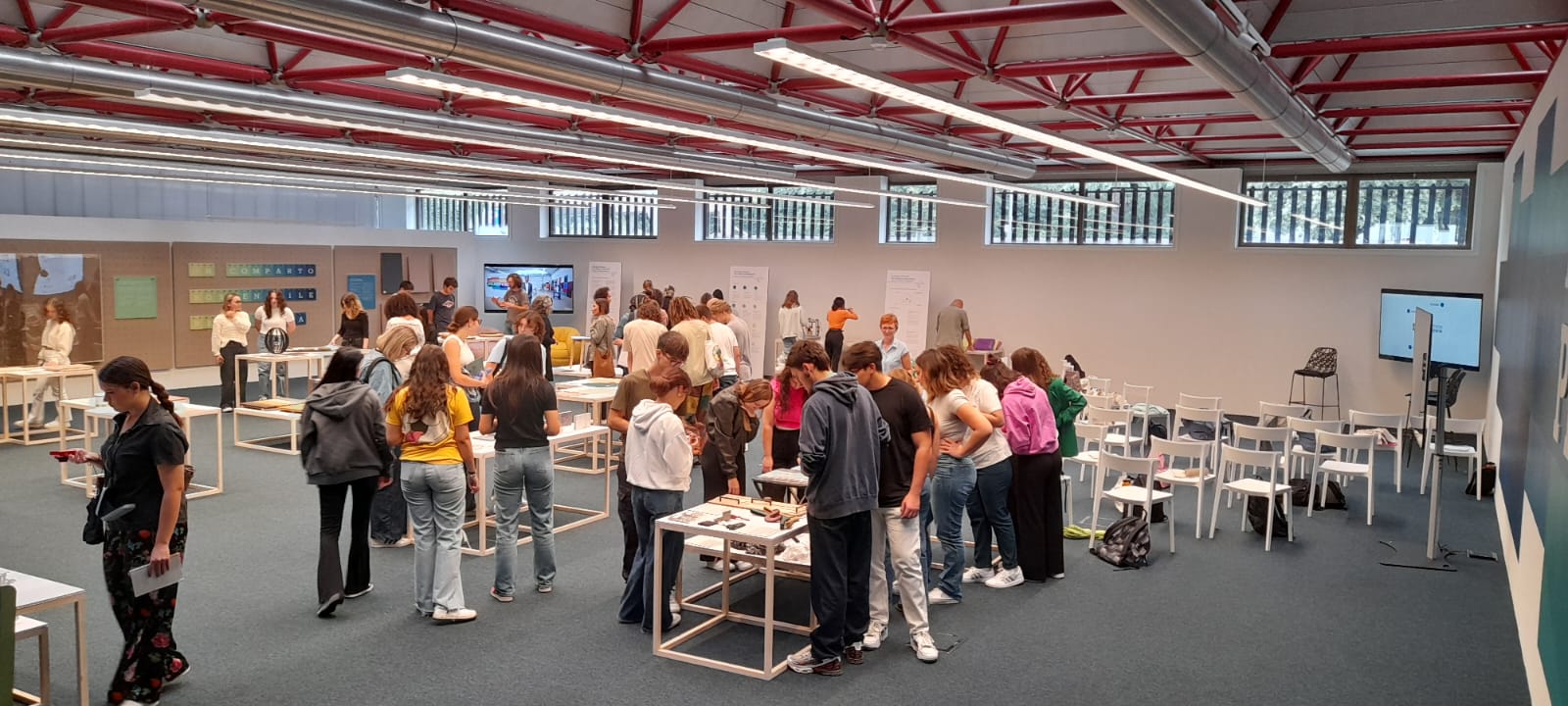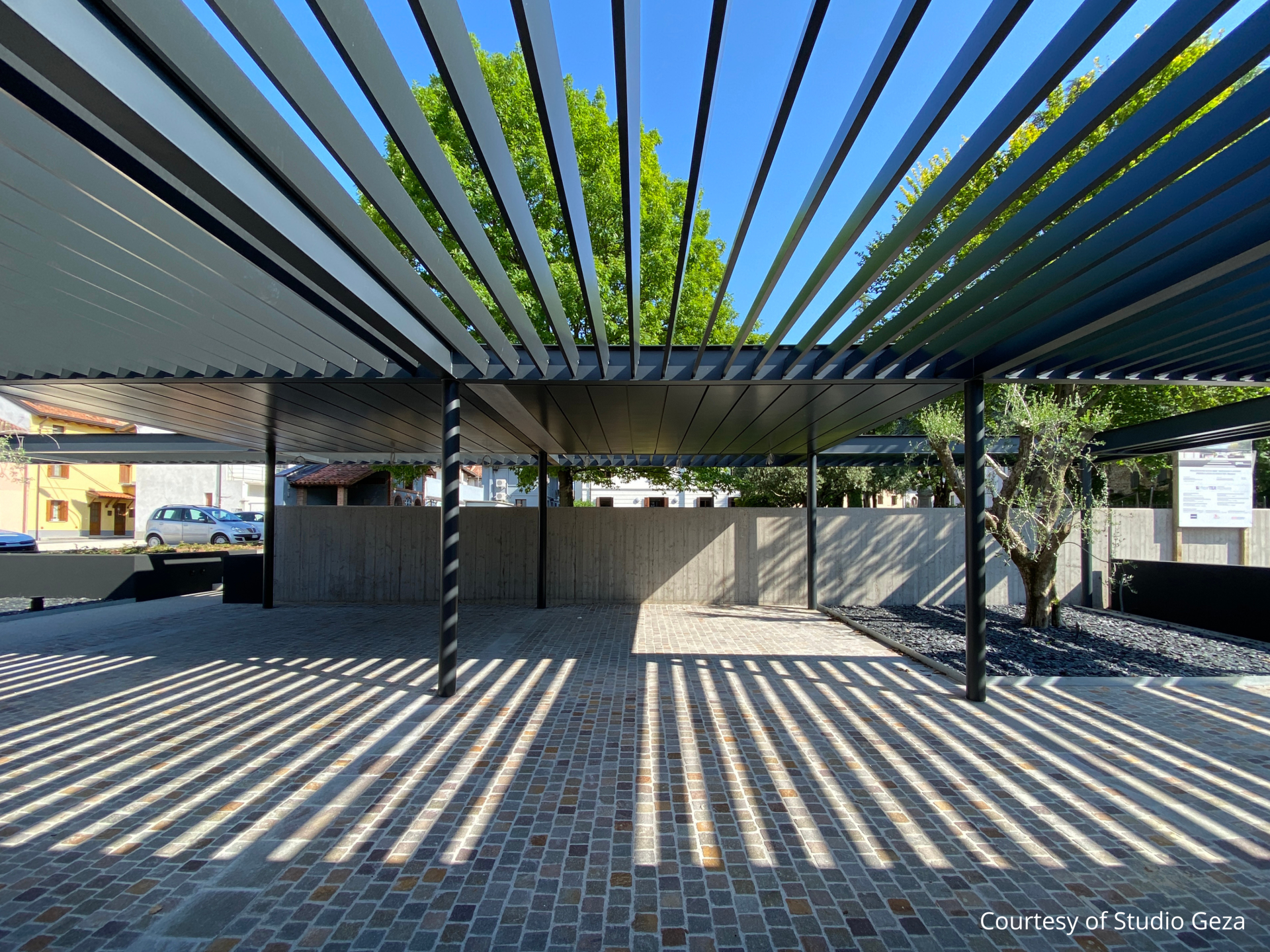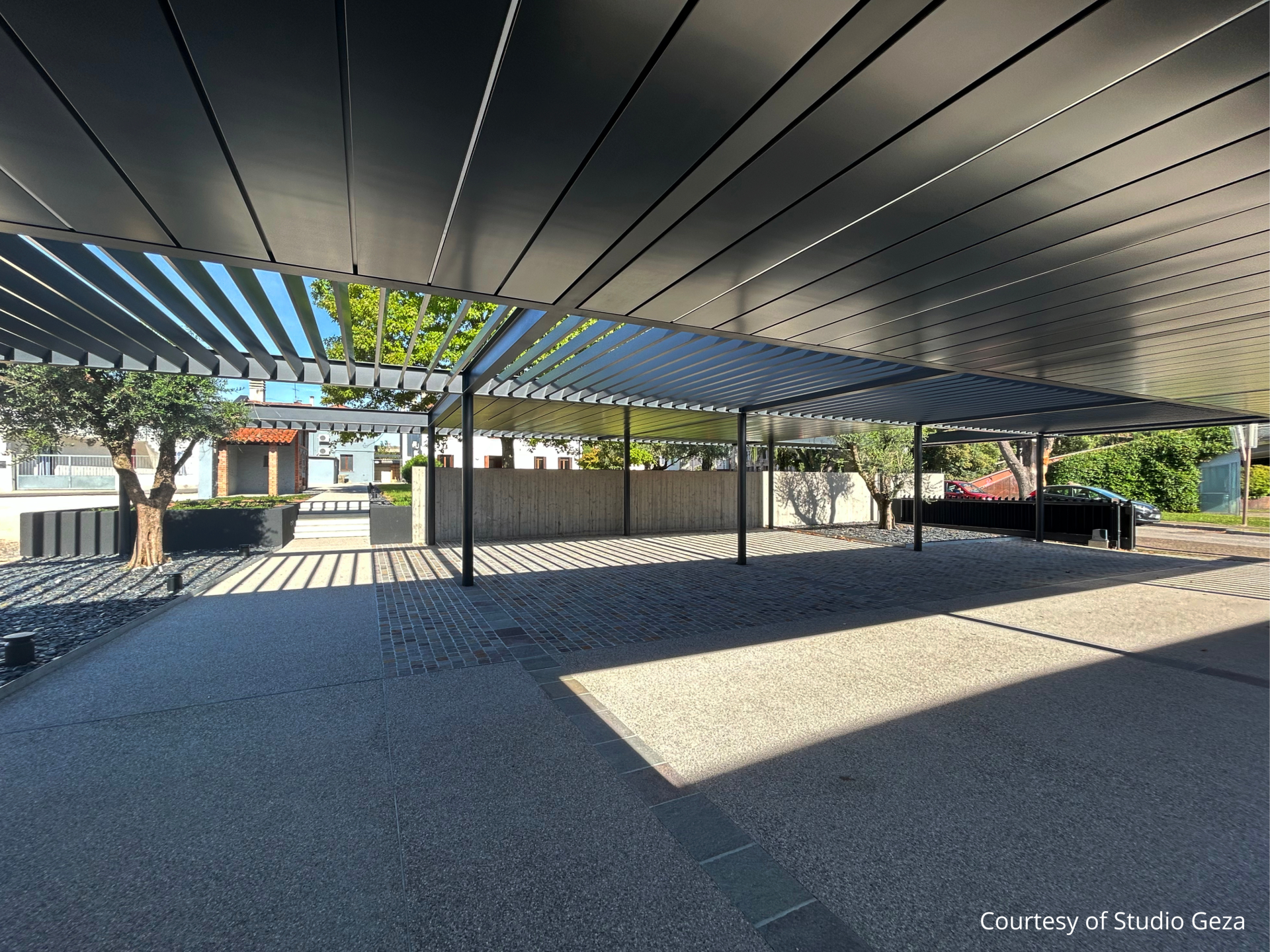Innovation Platform
Basic information
Project Title
Innovation Platform
Full project title
Innovation Platform - Ecodesign & Sustainablity
Category
Shaping a circular industrial ecosystem and supporting life-cycle thinking
Project Description
A new lab in Manzano, Italy, the Innovation Platform Ecodesign & Sustainability is a cultural and social operation triggering a process of suburb regeneration by involving future talents, designers, companies, authorities and the local community. A wide space connected with nature open to exhibitions, events and forums on sustainability and ecodesign. Its goal is to open a place-based path to connect wood and furniture companies, mountain and urban areas to discuss locally on global challenges.
Geographical Scope
Regional
Project Region
Friuli Venezia Giulia, Italy
Urban or rural issues
It addresses urban-rural linkages
Physical or other transformations
It refers to a physical transformation of the built environment (hard investment)
EU Programme or fund
No
Description of the project
Summary
The Innovation Platform Ecodesign & Sustainability has been developed by a joint effort of the wood and furniture "Cluster Arredo" and Bancater with the design of GEZA architects. Situated in the Friuli Venezia Giulia region, is a living laboratory focused on nature-based urban regeneration.
The lab, located in the centre of the city of Manzano in a large historical building and launched in July 2023, hosts exhibitions, events and workshops that involve future talents, designers, companies, authorities and the local community reflecting on quality of life, design for all, accessibility, nature-based solutions, and circularity.
The Platform, through a place-based approach, connected different disciplines and target groups, encompassing rural, mountain, urban, and cross-border dimensions in a unique physical and virtual site, and made it possible to discuss global challenges. The aim is to foster sustainable evolution by studying circular industrial ecosystem models and sharing transdisciplinary know-how.
The 600sqm platform was opened after the refurbishment of an unused building, immersed in a magnificent park, in the centre of Manzano. The project has both revitalized the old structure and given it a more attractive and modern look by carrying out a process of urban renewal and building restoration, connecting it with nature.
The Centre, located at the gateway of urban and rural areas and surrounded by the wine valleys, is engaged in the territory's sustainable transition. The local community is welcome to discover and contribute to this process in order to enhance the development of a green lifestyle. This would include the spread of a more sustainable attitude within the civil society that prioritises recycling, product reuse, and thoughtful purchasing choices.
The lab, located in the centre of the city of Manzano in a large historical building and launched in July 2023, hosts exhibitions, events and workshops that involve future talents, designers, companies, authorities and the local community reflecting on quality of life, design for all, accessibility, nature-based solutions, and circularity.
The Platform, through a place-based approach, connected different disciplines and target groups, encompassing rural, mountain, urban, and cross-border dimensions in a unique physical and virtual site, and made it possible to discuss global challenges. The aim is to foster sustainable evolution by studying circular industrial ecosystem models and sharing transdisciplinary know-how.
The 600sqm platform was opened after the refurbishment of an unused building, immersed in a magnificent park, in the centre of Manzano. The project has both revitalized the old structure and given it a more attractive and modern look by carrying out a process of urban renewal and building restoration, connecting it with nature.
The Centre, located at the gateway of urban and rural areas and surrounded by the wine valleys, is engaged in the territory's sustainable transition. The local community is welcome to discover and contribute to this process in order to enhance the development of a green lifestyle. This would include the spread of a more sustainable attitude within the civil society that prioritises recycling, product reuse, and thoughtful purchasing choices.
Key objectives for sustainability
A process of sustainable regeneration, this is the core idea that launched the Innovation Platform project and that has been followed throughout its creation. Sustainability within the building itself, searching for local bio/eco-materials for furnishing and for the best innovations for the materials exhibition, and outside the space: stimulating a sustainable entrepreneurship and an empowered community.
The idea that started the proposition unifies a common need that Cluster Arredo gathered by constant contact with companies and talented students: the need of learning more and developing tools to evolve in a greener production and generate a sustainable final product with clear in mind regional, national and European policies highlighting the need of enhancing sustainability and circularity in all aspects of production, and of life.
The project aims at fostering sustainability finding local solutions and expanding to national, european and international level with a specific communication approach; offering a concrete space to companies and students to learn and discuss on eco-design and nature-based materials; creating a vivid platform aiming at involving not only companies, but also younger generations, designers, municipalities and civil society, international partners to work together on circular solutions, share best practices and implement green approaches. A cultural and social transition towards advanced circularity and eco-design by promoting exchanges of ideas and practices of activities such as reuse, reduce and recycle. These objectives have been met by physically creating the platform at the core of the Chair District and by activating events, materials expositions, communication and stakeholders involvement. The project made clear since its creation that a platform where actors from different levels can meet, discuss, share and improve generates an escalation of interest and actions in enhancing sustainability.
The idea that started the proposition unifies a common need that Cluster Arredo gathered by constant contact with companies and talented students: the need of learning more and developing tools to evolve in a greener production and generate a sustainable final product with clear in mind regional, national and European policies highlighting the need of enhancing sustainability and circularity in all aspects of production, and of life.
The project aims at fostering sustainability finding local solutions and expanding to national, european and international level with a specific communication approach; offering a concrete space to companies and students to learn and discuss on eco-design and nature-based materials; creating a vivid platform aiming at involving not only companies, but also younger generations, designers, municipalities and civil society, international partners to work together on circular solutions, share best practices and implement green approaches. A cultural and social transition towards advanced circularity and eco-design by promoting exchanges of ideas and practices of activities such as reuse, reduce and recycle. These objectives have been met by physically creating the platform at the core of the Chair District and by activating events, materials expositions, communication and stakeholders involvement. The project made clear since its creation that a platform where actors from different levels can meet, discuss, share and improve generates an escalation of interest and actions in enhancing sustainability.
Key objectives for aesthetics and quality
A cultural, visual and aesthetic experience starts when entering the regenerated spaces of the Innovation Platform. The outside area mixes solid lines with olive trees and plants, giving a forward visualization of the mountain-urban connubia. Ceiling windows and bright colors surround the visitor once entering the inner open space, though indoor plants offer a reconnection with the outside space.
The idea behind the renewal project was to generate a colorful and attractive place where to find and create innovative solutions. For this reason, the Innovation Platform was designed thinking about a strategic and appealing use of the spaces, governed by light and color. The idea was to create an open-space effect, with a linear and clear design, to focus attention on what is shown inside. The design selected is modern, catchy, and allows an easy maintenance of spaces and the possibility to remodulate the exhibition following the necessities and the typology of samples exposed, guaranteeing each time different experiences for the visitors: the project structure changes according to the needs of the users. Innovation Platform was structured creating both a concrete space to show samples and applications of green solutions and a specific space that can be used for discussions and meetings to foster cooperation among the main territorial and extraterritorial actors. The exhibition space, which is in continuous evolution to always show different solutions, presents samples provided by local companies and, at the same time, composite-based examples provided by national and international actors.
Its look and texture wants to create an echo, a regeneration of a central building that can be used by all and is created for all. A beautiful, inclusive agora for creation and communication to let the sustainability talk settle in and nourish, to show that sustainable is not only useful but also delightful.
The idea behind the renewal project was to generate a colorful and attractive place where to find and create innovative solutions. For this reason, the Innovation Platform was designed thinking about a strategic and appealing use of the spaces, governed by light and color. The idea was to create an open-space effect, with a linear and clear design, to focus attention on what is shown inside. The design selected is modern, catchy, and allows an easy maintenance of spaces and the possibility to remodulate the exhibition following the necessities and the typology of samples exposed, guaranteeing each time different experiences for the visitors: the project structure changes according to the needs of the users. Innovation Platform was structured creating both a concrete space to show samples and applications of green solutions and a specific space that can be used for discussions and meetings to foster cooperation among the main territorial and extraterritorial actors. The exhibition space, which is in continuous evolution to always show different solutions, presents samples provided by local companies and, at the same time, composite-based examples provided by national and international actors.
Its look and texture wants to create an echo, a regeneration of a central building that can be used by all and is created for all. A beautiful, inclusive agora for creation and communication to let the sustainability talk settle in and nourish, to show that sustainable is not only useful but also delightful.
Key objectives for inclusion
As an inclusive project, the Innovation Platform is an open lab that can be experienced virtually through online events and physically through visits and meetings. Its physical location is accessible to all, having incorporated features to remove physical barriers and adapt the spaces to people of all abilities. Its virtual attitude makes it accessible to people from abroad. Companies, citizens, academics, designers, students, authorities are encouraged to enjoy and use the spaces free of charge to visit, see, touch, learn, discuss, act and re-act to the cultural and social inputs given by experiencing the Platform.
The materials-exhibition, which enriches the center of the space, ranges from the raw wood to the re-adapted furniture, willing to cover all aspects of a sustainable approach. It is constantly evolving making each experience a one of a kind. We are continually searching for new materials to be included both in the expo and in the furnishing of the space, which uses bio and sustainable materials provided by local companies mixed with natural components such as beautiful plants. A mixture of local and international materials to create a circular path in terms of research and applicability of sustainability.
The Innovation Platform is a project for all, encouraging new talents to fall in love with the aesthetics and develop competences for the future not only in relation to the furniture sector, but also on a wider level thanks to the fulfillment of a space regeneration. It is the lab for people to interact to discuss sustainability, express doubts, achieve results. It supports the exchange of knowledge between young and old, fresh ideas and experience, rural and urban entrepreneurship and competences, making it a concept replicable in other territories sharing similar objectives.
The materials-exhibition, which enriches the center of the space, ranges from the raw wood to the re-adapted furniture, willing to cover all aspects of a sustainable approach. It is constantly evolving making each experience a one of a kind. We are continually searching for new materials to be included both in the expo and in the furnishing of the space, which uses bio and sustainable materials provided by local companies mixed with natural components such as beautiful plants. A mixture of local and international materials to create a circular path in terms of research and applicability of sustainability.
The Innovation Platform is a project for all, encouraging new talents to fall in love with the aesthetics and develop competences for the future not only in relation to the furniture sector, but also on a wider level thanks to the fulfillment of a space regeneration. It is the lab for people to interact to discuss sustainability, express doubts, achieve results. It supports the exchange of knowledge between young and old, fresh ideas and experience, rural and urban entrepreneurship and competences, making it a concept replicable in other territories sharing similar objectives.
Results in relation to category
The Innovation Platform Ecodesign & Sustainability was officially opened to the public in July 2023. As regards to innovative solutions exposed in the area, Cluster Arredo has been able to involve more than 62 companies from 13 European and non-European countries so far, which decided to cooperate with Cluster by providing 71 different types of samples and materials, including bio-paints, recycled wood waste, foams, etc. To periodically refresh the materials and the samples exposed, Cluster Arredo’s team is constantly in contact with new local, national, and international actors; as a result, the network of contacts grows periodically and involves new realities and actors in the project activities.
From the very beginning, the project focused on the importance of promotion by organising events, workshops, and initiatives, which involved both the local community and the industrial sector, counting on more than 300 visitors just in the first months, guided tours for more than 120 national and international students, explaining to them the vision of the Innovation Platform. Alongside, Cluster Arredo periodically organises open days to invite the community to visit the spaces and discover how beauty can be matched to sustainability.
At the core of this kind of activities there is the specific purpose to raise the interest on this topic among the local and international actors by shifting the attention to the many opportunities there are at disposal and, at the same time, sensitise them towards the vision that governs the Innovation Platform project. The echo and the great participation demonstrated so far reveals the importance of supporting communities with this kind of initiatives in discovering through the design how feasible sustainability can be. The project impact has just started emerging and the activities that will evolve in it will shape its future and how it will endure its core mission for the community.
From the very beginning, the project focused on the importance of promotion by organising events, workshops, and initiatives, which involved both the local community and the industrial sector, counting on more than 300 visitors just in the first months, guided tours for more than 120 national and international students, explaining to them the vision of the Innovation Platform. Alongside, Cluster Arredo periodically organises open days to invite the community to visit the spaces and discover how beauty can be matched to sustainability.
At the core of this kind of activities there is the specific purpose to raise the interest on this topic among the local and international actors by shifting the attention to the many opportunities there are at disposal and, at the same time, sensitise them towards the vision that governs the Innovation Platform project. The echo and the great participation demonstrated so far reveals the importance of supporting communities with this kind of initiatives in discovering through the design how feasible sustainability can be. The project impact has just started emerging and the activities that will evolve in it will shape its future and how it will endure its core mission for the community.
How Citizens benefit
At the core of the italian north-east Chair District, the Innovation Platform project creates a new space to enrich the territory and expand knowledge and competences outside regional borders. The urban community of the city of Manzano has been addressed before preparing the project, to gather inputs that would help its co-design. After the project launch, the local community has been indicated as a receiver and supporter of the project, with concrete actions of involvement such as organization of open visits to the material exhibition in the Platform, events participation and also for gathering inputs for improvement.
The Platform, in linear connection with a beautiful park, has been the first step of a project of suburb regeneration, connecting the central buildings of the city center with nature and a more open space to enjoy. The following steps will be the creation of a Museum of the Chair in partnership with the Municipality of Manzano, to enhance the historical heritage. With an international focus, it mostly includes a place-based path that aims at enriching the urban territory, offering a concrete way to a more social entrepreneurship towards collective well-being. The Platform well represents the need of this region to link together the mountain area, with its 300.000 ha of forests, to the industrial area, paving the way to a dialogue between citizens and talents of the future. The Platform is a vivid lab designed to translate needs into new regenerative models for companies, for students, for citizens, for all. Involving the civil society in creative thinking and practices to foster social and territorial renovation.
The cultural operation of the Innovation Platform project is a vision replicated on the territory, opening a virtual and, most of all, physical space to enrich the community and carve sustainable entrepreneurs.
The Platform, in linear connection with a beautiful park, has been the first step of a project of suburb regeneration, connecting the central buildings of the city center with nature and a more open space to enjoy. The following steps will be the creation of a Museum of the Chair in partnership with the Municipality of Manzano, to enhance the historical heritage. With an international focus, it mostly includes a place-based path that aims at enriching the urban territory, offering a concrete way to a more social entrepreneurship towards collective well-being. The Platform well represents the need of this region to link together the mountain area, with its 300.000 ha of forests, to the industrial area, paving the way to a dialogue between citizens and talents of the future. The Platform is a vivid lab designed to translate needs into new regenerative models for companies, for students, for citizens, for all. Involving the civil society in creative thinking and practices to foster social and territorial renovation.
The cultural operation of the Innovation Platform project is a vision replicated on the territory, opening a virtual and, most of all, physical space to enrich the community and carve sustainable entrepreneurs.
Physical or other transformations
It refers to a physical transformation of the built environment (hard investment)
Innovative character
The Platform carries Innovation in its name, making it the backbone of the project. It offers a new process of incorporation of needs and solutions by being created from the community to the community. The strategic location of the Innovation Platform is of particular interest. The Platform is based at the core of the Chair District, furniture producing area in the Italian Region of Friuli Venezia Giulia. This Region stands out on a national and international level for the substantial contribution it gives to the national economic growth and the definition of the globally well-known brand “Made in Italy”. According to the most recent figures, the regional furniture and wood’s manufacturing industry relies on approx 2300 active companies. In addition to that, this area stands out also for an important heritage of social entrepreneurship, with great efforts such as the ones of Zanussi and Rino Snaidero Scientific Foundation.
All this considered, the Platform intends to give space to these local key elements, to create interaction between entrepreneurship and future talents. The project offers Manzano and its community a laboratory in which sectoral experts, younger generations and the community as a whole can actively participate. The Platform stands out of its distinctive polyfunctional character which helps different participatory and transdisciplinary approaches. It functions as an exhibition area to discover new sustainable materials and applications targeting companies, students and everyone interested or purely curious. The Platform is also the location for lectures and workshops that focus on the most recent solutions developed, considering different approaches and points of view: from market studies and forecasts to technical advisory and the study of new technological solutions.
All this considered, the Platform intends to give space to these local key elements, to create interaction between entrepreneurship and future talents. The project offers Manzano and its community a laboratory in which sectoral experts, younger generations and the community as a whole can actively participate. The Platform stands out of its distinctive polyfunctional character which helps different participatory and transdisciplinary approaches. It functions as an exhibition area to discover new sustainable materials and applications targeting companies, students and everyone interested or purely curious. The Platform is also the location for lectures and workshops that focus on the most recent solutions developed, considering different approaches and points of view: from market studies and forecasts to technical advisory and the study of new technological solutions.
Disciplines/knowledge reflected
Art, design, efficiency and beauty gave shape to the Innovation Platform project. Aimed at inspiring visitors towards a new sensibility to the concept of sustainability, the project has been followed by different professionals in both the fields of eco-design and wood-furniture sector from the very beginning, who cooperated together to reach the expected final result. For this reason, the spaces are planned to reflect the need for a sustainable evolution of the entire wood-furniture value chain starting from its structure. The renewed building which perfectly expresses the combination between art and eco-design in a plan of requalification, takes advantage of the natural light thanks to the installation of skylights on the ceiling and, at the same time, the specific disposition of spaces enhance energy efficiency of the building. In the Platform design tradition and innovation meet, encouraging activities working on overcoming this potential duality.
Innovation Platform eco-design & sustainability is shaped through a multidisciplinary approach, taking in consideration the entire knowledge of the wood-furniture value chain. On the one hand, the challenges related to the wood as raw material, and the need to find new solutions for supporting local climate adaptation in mountain and forestry areas. On the other hand, the need of answering to urban and industrial necessities, by mixing expertise, tradition, design, and innovation to give rise to new creative solutions demonstrating the importance for all to take part in the green transition.
The final vision of the Innovation Platform emphasises a common pathway that encompasses the entire value chain and the related ones, which is the need of implementing circular models and promoting the use of recycled-based materials in the sector by preserving creativity and beauty.
Innovation Platform eco-design & sustainability is shaped through a multidisciplinary approach, taking in consideration the entire knowledge of the wood-furniture value chain. On the one hand, the challenges related to the wood as raw material, and the need to find new solutions for supporting local climate adaptation in mountain and forestry areas. On the other hand, the need of answering to urban and industrial necessities, by mixing expertise, tradition, design, and innovation to give rise to new creative solutions demonstrating the importance for all to take part in the green transition.
The final vision of the Innovation Platform emphasises a common pathway that encompasses the entire value chain and the related ones, which is the need of implementing circular models and promoting the use of recycled-based materials in the sector by preserving creativity and beauty.
Methodology used
The project has been structured combining two approaches. First of all, it has been designed with the aim of participating in the green transition that the European Union is striving for to implement effective social and economic sustainability solutions. The project’s activities, from the showcase of innovative materials to the study of Ecodesign projects and circular industrial processes, are organised to help companies and all social stakeholders to give a meaningful contribution to address global challenges such as climate change and environmental degradation. All this has been designed focusing on a local level, i.e. on the regional manufacturing area, taking into consideration that the project can launch a virtuous cycle that positively contributes to the efforts that are globally done to foster sustainability.
The project has been developed considering not only global challenges but also local needs. Constantly in contact with the regional community, Cluster Arredo has observed the need of companies for adequate support in their process of green transition. This means not only financial support but also the presence of a reference point, a sort of think tank that displays a set of new inputs, ideas, prototypes, good practice models, updates regarding national and European regulations, workshops focusing on the most recent technological solutions to foster a transdisciplinary exchange.
These approaches have been adopted to be combined to look simultaneously both at the local and the global. Working with local companies, experts, schools and universities with the aim of connecting them to international stakeholders to create a positive synergy within all the involved actors, all striving for a common goal.
The project has been developed considering not only global challenges but also local needs. Constantly in contact with the regional community, Cluster Arredo has observed the need of companies for adequate support in their process of green transition. This means not only financial support but also the presence of a reference point, a sort of think tank that displays a set of new inputs, ideas, prototypes, good practice models, updates regarding national and European regulations, workshops focusing on the most recent technological solutions to foster a transdisciplinary exchange.
These approaches have been adopted to be combined to look simultaneously both at the local and the global. Working with local companies, experts, schools and universities with the aim of connecting them to international stakeholders to create a positive synergy within all the involved actors, all striving for a common goal.
How stakeholders are engaged
The project idea planted its initial roots in the selected physical place by understanding the issues, interconnections and relationships of the city and, from there, it designed coordinating actions to improve the community well-being supported by a multi-level engagement. It has then taken shape thanks to the involvement of a miscellaneous of stakeholders with a quadruple helix approach both in the preparation phase and in the implementation of activities after the official launch. In the initial phase, local and regional stakeholders were involved to brainstorm ideas to shape the proposal, with clear attention to the Autonomous Region FVG policies. Companies, municipalities, academia, students and designers' needs were taken into consideration when preparing and planning its future utilization. Peer together with vertical exchanges have been crucial to define the main features of the Platform and that fostered the idea of an open evolving space that can adapt to the visitor’s needs.
The Platform, starting from the local designing phase, has then been modeled with a national and European purpose, being shared and discussed with national authorities, national and european clusters, companies, schools and universities from other countries. All the feedback gathered from these stakeholders has been unified and used to adapt the project and its essential features. The level of involvement has varied in the different phases: with a more local involvement in the first designing phase and a broader approach during the project implementation. A miscellaneous involvement of stakeholders which acted both as advisors and receivers, givers and takers of the same experience, thus adding augmented value and relevant inputs.
The Platform, starting from the local designing phase, has then been modeled with a national and European purpose, being shared and discussed with national authorities, national and european clusters, companies, schools and universities from other countries. All the feedback gathered from these stakeholders has been unified and used to adapt the project and its essential features. The level of involvement has varied in the different phases: with a more local involvement in the first designing phase and a broader approach during the project implementation. A miscellaneous involvement of stakeholders which acted both as advisors and receivers, givers and takers of the same experience, thus adding augmented value and relevant inputs.
Global challenges
The local solutions provided by the project help facing global challenges like climate change, the spread within society of a higher environmental awareness and more sustainable lifestyles as well as the industrial green transition - targeting specific urban and social issues.
The project contributes to challenge the transition with the exposition of innovative, circular material samples, providing companies with new material solutions they can adopt in their production processes. These materials go from eco-foams for upholstered furniture to recycled wood panels. The visit to the exposition functions, however, as one of the steps of the environmental sensibilization process. The Platform organises specific workshops to deeply explore Ecodesign and sustainable production solutions, fostering the exchange of ideas between the participants and connecting experts from different fields, from rural forests to urban industries.
Considering the social and urban dimension, the project has contributed to the process of suburb regeneration of the area in which the platform has been created. This intervention has resulted in the refurbishment of an unused building, giving it a new scope. The project integrates the Cluster’s activities targeting the regional furniture sector and, at the same time, it is open to the whole civil society to communicate new sustainable solutions and foster the spread of good practices that improve life quality. This linking role is represented in the very location of the Platform: set in front of the Cluster’s main location, it is set at the centre of Manzano and its main public services. Moreover, the Platform collaborates with schools and universities, aiming at supporting the younger talents in the development of crucial skills that will play a crucial role in the industrial production of the future.
The project contributes to challenge the transition with the exposition of innovative, circular material samples, providing companies with new material solutions they can adopt in their production processes. These materials go from eco-foams for upholstered furniture to recycled wood panels. The visit to the exposition functions, however, as one of the steps of the environmental sensibilization process. The Platform organises specific workshops to deeply explore Ecodesign and sustainable production solutions, fostering the exchange of ideas between the participants and connecting experts from different fields, from rural forests to urban industries.
Considering the social and urban dimension, the project has contributed to the process of suburb regeneration of the area in which the platform has been created. This intervention has resulted in the refurbishment of an unused building, giving it a new scope. The project integrates the Cluster’s activities targeting the regional furniture sector and, at the same time, it is open to the whole civil society to communicate new sustainable solutions and foster the spread of good practices that improve life quality. This linking role is represented in the very location of the Platform: set in front of the Cluster’s main location, it is set at the centre of Manzano and its main public services. Moreover, the Platform collaborates with schools and universities, aiming at supporting the younger talents in the development of crucial skills that will play a crucial role in the industrial production of the future.
Learning transferred to other parties
Innovation Platform presents several replicable characteristics, which make the project idea applicable in different regions or countries with the same needs but also to industries, different from the furniture one. The pathway followed to reach the final result has been linear, concrete, and sensible to the community needs.
Concerning methodology, Cluster Arredo decided to firstly scout which were the main needs and lacks from both industrial and civil point of view, implementing a bottom-up approach. Moreover, several consultations were organised involving local and regional authorities. This practical approach has proved as useful because of the involvement of the entire community in the decision-making process from the very beginning.
As regards to the renewal project, Cluster Arredo focused on the importance of giving to the building a modern and catchy style, so as to capture attention and entice people to see what is inside. Moreover, another important aspect of the process is the involvement of local, national, and international companies. Specific attention must be given to their active role, which was crucial for the success of the project. More precisely, various meetings were organised with the companies which decided to cooperate with Cluster Arredo FVG, to discuss which could be the most innovative solutions to include in the exhibition and the most effective way to exhibit the samples and examples of application of green solutions in the Platform.
At the same time, one of the key elements of the Platform is the possibility to use the spaces in a multifunctional way, which allows the organisation of open days for civil society, initiatives and events for companies, local or international students, and universities. This vision guarantees the transferability of the know-how and an effective promotion of the eco-design solutions presented inside the Innovation Platform.
Concerning methodology, Cluster Arredo decided to firstly scout which were the main needs and lacks from both industrial and civil point of view, implementing a bottom-up approach. Moreover, several consultations were organised involving local and regional authorities. This practical approach has proved as useful because of the involvement of the entire community in the decision-making process from the very beginning.
As regards to the renewal project, Cluster Arredo focused on the importance of giving to the building a modern and catchy style, so as to capture attention and entice people to see what is inside. Moreover, another important aspect of the process is the involvement of local, national, and international companies. Specific attention must be given to their active role, which was crucial for the success of the project. More precisely, various meetings were organised with the companies which decided to cooperate with Cluster Arredo FVG, to discuss which could be the most innovative solutions to include in the exhibition and the most effective way to exhibit the samples and examples of application of green solutions in the Platform.
At the same time, one of the key elements of the Platform is the possibility to use the spaces in a multifunctional way, which allows the organisation of open days for civil society, initiatives and events for companies, local or international students, and universities. This vision guarantees the transferability of the know-how and an effective promotion of the eco-design solutions presented inside the Innovation Platform.
Keywords
Sustainability & ecodesign
Suburb regeneration
Open space lab
Social and sustainable entrepreneurship
Future talents

